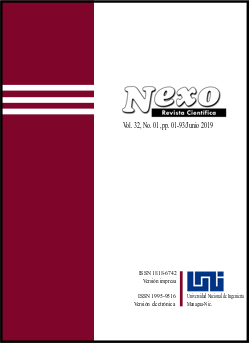Analysis of the process of yuca flour, on the sensory and nutritional properties of the casabe (Professional paper)
DOI:
https://doi.org/10.5377/nexo.v32i01.7992Keywords:
Casaba, Process, Garifuna, Nutritional valueAbstract
This work aimed at the development and determination of the ideal formulation for the production of cassava, as well as the determination of the impact of drying kinetics on its sensory properties. Three formulations were prepared for the production of cassava of the variety Valencia (sweet) and cassava of the variety Ceiba (bitter), for the mixture design was counted on three variables; (Cassava flour, sea water and garlic), where it was determined from the mass-energy balance and sensorial analysis with hedonic tests applied to people belonging to the Garífuna people, that the casabe made from cassava of the variety Ceiba is the most accepted, at the same time the drying temperature, heat transfer speed and yield in the elaboration. Subsequently to the selected cassava were determined percentages of moisture, dry matter, protein nitrogen, protein, crude, fiber, ash, fat, starch and crude energy. The chemical quality of the Honduran casabe was compared with the Venezuelan one, being different in its composition and due to its poor nutritional value, could affect the health of the Garífuna people of Honduras.
Downloads
Downloads
Published
How to Cite
Issue
Section
License
The authors who publish in Nexo Scientific Journal agree to the following terms:
- Authors retain the copyright and grant the journal the right of the first publication under the license Creative Commons Attribution License https://creativecommons.org/licenses/by/3.0/, which allows others to share the work with a recognition of the authorship of the work and the initial publication in Nexo Scientific Journal.
- Authors may separately establish additional agreements for the non-exclusive distribution of the version of the work published in the journal (for example, in an institutional repository or a book), with the recognition of the initial publication in Nexo Scientific Journal.
- Authors are allowed and encouraged to disseminate their works electronically (for example, in institutional repositories or in their own website) before and during the submission process, as it can lead to productive exchanges, as well as earlier and greater citation of published works.











